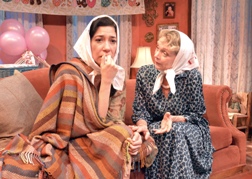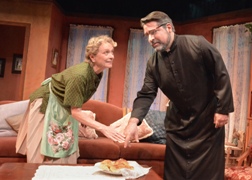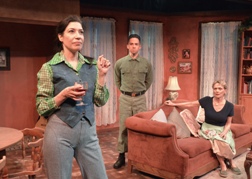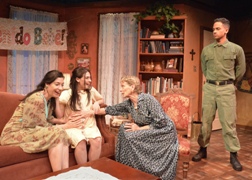
Playwright Stephanie Alison Walker pays tribute to the women who would not be silenced when their sons and daughters started disappearing by the thousands during the “dirty war” waged by the Argentine military dictatorship on its own citizens beginning in the mid-1970s in The Madres, another powerhouse Skylight Theatre World Premiere.
 The year is 1978, the city is Buenos Aires, and Carolina Acosta (Arianna Ortiz) is one of the white-scarfed mothers marching each and every Thursday before the Presidential Palace demanding to know the whereabouts of men and women “helped into” Ford Falcons and never to be seen or heard of again, “disappeared” for no greater reason than beliefs that ran counter to the government’s insistence on a same-mind, same-values populace.
The year is 1978, the city is Buenos Aires, and Carolina Acosta (Arianna Ortiz) is one of the white-scarfed mothers marching each and every Thursday before the Presidential Palace demanding to know the whereabouts of men and women “helped into” Ford Falcons and never to be seen or heard of again, “disappeared” for no greater reason than beliefs that ran counter to the government’s insistence on a same-mind, same-values populace.
 Carolina makes this very public protest over the objections of her mother Josefina (Margarita Lamas) and longtime family priest Padre Juan (Gabriel Romero), both of whom would rather maintain the fiction that the pregnant Belén is off enjoying Paris with her songwriter husband Agustín and not held captive closer to home.
Carolina makes this very public protest over the objections of her mother Josefina (Margarita Lamas) and longtime family priest Padre Juan (Gabriel Romero), both of whom would rather maintain the fiction that the pregnant Belén is off enjoying Paris with her songwriter husband Agustín and not held captive closer to home.
 Josefina’s concerns for her daughter’s safety are heightened when Diego Hernández (Alexander Pimentel), no longer a child hopelessly smitten by his classmate Belén but a twenty-year-old soldier, shows up at her doorstep with questions about her “subversive” son-in-law, accused of writing songs whose “ideas … go against our Western and Christian civilization.”
Josefina’s concerns for her daughter’s safety are heightened when Diego Hernández (Alexander Pimentel), no longer a child hopelessly smitten by his classmate Belén but a twenty-year-old soldier, shows up at her doorstep with questions about her “subversive” son-in-law, accused of writing songs whose “ideas … go against our Western and Christian civilization.”
While Josefina insists on believing her granddaughter safe in Paris (or at least on pretending to do so), Carolina comes up with a plan inspired by rumors circulating around Buenos Aires of desaparecidos suddenly showing up for special occasions—a funeral, a wedding, or perhaps a baby shower for Belén that might return her to the land of the living.
 As to whether Carolina’s plan will work or not, production stills posted prominently at the Skylight Theater entrance make it all too clear to anyone giving them more than a casual glance exactly who the character listed in the program as Desaparecida (Natalie Llerena) will be.
As to whether Carolina’s plan will work or not, production stills posted prominently at the Skylight Theater entrance make it all too clear to anyone giving them more than a casual glance exactly who the character listed in the program as Desaparecida (Natalie Llerena) will be.
Suffice it to say that if the dramatic stakes have already been high in Act One, they positively skyrocket post-intermission.
 Playwright Walker could scarcely have predicted when writing The Madres that its debut would coincide with discovery by American women of their own public voice, just one reason why her play has a power it might not have had in a pre-Trump, pre-#metoo world.
Playwright Walker could scarcely have predicted when writing The Madres that its debut would coincide with discovery by American women of their own public voice, just one reason why her play has a power it might not have had in a pre-Trump, pre-#metoo world.
Snippets of distinctively Argentinean Spanish blend seamlessly with subtly-accented English dialog to give The Madres particular authenticity as do the sweet crescent roles called medialunas and the infusion drink called mate that Josefina insists on serving guests as if their visits were anything other than unfriendly.
Performances could not be finer under Sara Guerrero’s incisive direction, beginning with Lamas’s splendid Josefina, steadfastly clinging to hope, or at least a semblance of normalcy at a time when there is no such thing.
 Pimentel’s tough-as-nails Diego reveals the cost of political fanaticism on a young man’s heart and soul, Romero is terrific too as a priest who may have his own sins to confess, and Llerena is heartbreaking as a woman given a brief taste of a freedom she once took for granted.
Pimentel’s tough-as-nails Diego reveals the cost of political fanaticism on a young man’s heart and soul, Romero is terrific too as a priest who may have his own sins to confess, and Llerena is heartbreaking as a woman given a brief taste of a freedom she once took for granted.
Most magnificent of all is Ortiz’s Carolina, running the gamut of emotions from hope to fear to anger to despair to steely determination never to give up or give in.
 Scenic designer Christopher Scott Murillo gives Josefina’s modest Buenos Aires apartment the same look of authenticity that costume designer Jojo Siu does the characters’ ‘70s garb and sound designer Corinne Carrillo the music emanating from Josefina’s console stereo. Wesley Charles Chew’s lighting is both dramatic and subtle, with black-and-white projections adding to the dramatic impact by evoking images of the real-life desaparecidos.
Scenic designer Christopher Scott Murillo gives Josefina’s modest Buenos Aires apartment the same look of authenticity that costume designer Jojo Siu does the characters’ ‘70s garb and sound designer Corinne Carrillo the music emanating from Josefina’s console stereo. Wesley Charles Chew’s lighting is both dramatic and subtle, with black-and-white projections adding to the dramatic impact by evoking images of the real-life desaparecidos.
The Madres is produced by Gary Grossman, Tony Abatemarco, and Jonathan Muñoz-Proulx. Elissa Barrett, Josh Gershick, Kate Luhr, and Marcelo Tubert are associate producers. Casting is by Raul Clayton Staggs. Christopher Hoffman is production stage manager. Denise Blasor takes over the role of Josefina on April 6.
Las madres de Buenos Aires may have begun their weekly vigils in the 1970s, but like those who continue marching today in hopes of finding the children of the disappeared, Stephanie Alison Walker’s The Madres remains as powerful and relevant in 2018 as it would have been when The Mothers first took to the streets.
Skylight Theatre, 1816 N. Vermont Ave., Los Angeles.
www.skylighttheatrecompany.com
–Steven Stanley
March 26, 2018
Photos: Ed Krieger
Tags: Los Angeles Theater Review, Skylight Theatre, Stephanie Alison Walker



 Since 2007, Steven Stanley's StageSceneLA.com has spotlighted the best in Southern California theater via reviews, interviews, and its annual StageSceneLA Scenies.
Since 2007, Steven Stanley's StageSceneLA.com has spotlighted the best in Southern California theater via reviews, interviews, and its annual StageSceneLA Scenies.







 COPYRIGHT 2025 STEVEN STANLEY :: DESIGN BY
COPYRIGHT 2025 STEVEN STANLEY :: DESIGN BY